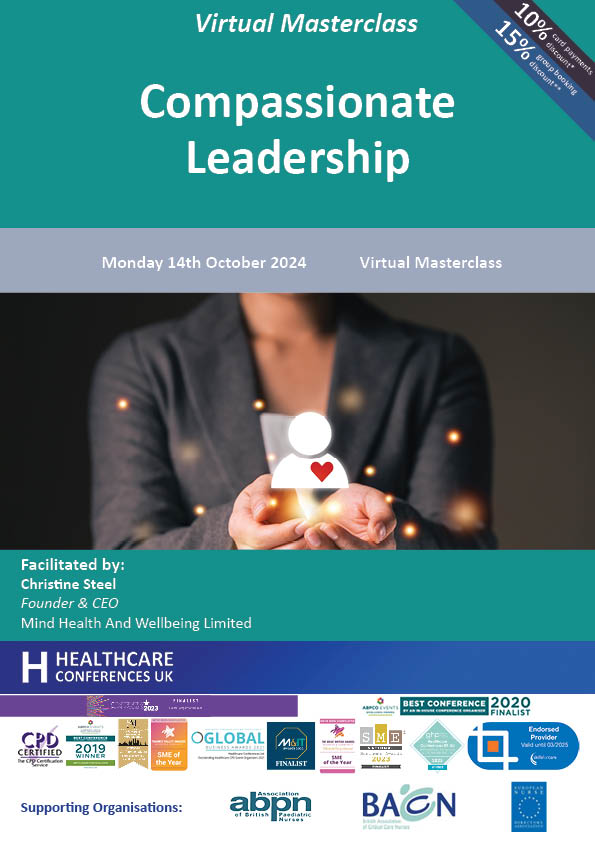This virtual one day masterclass, facilitated by Christine Steel, will focus on compassionate leadership, highlighting the benefits of building and sustaining a compassionate culture. Raising awareness of the connection between compassionate leadership and emotional intelligence.
The key to improving workplace wellbeing lies in culture, leadership, and management behaviour. With the number of people off on long-term sick at a 10-year high and the NHS stretched to the max, it’s more important than ever that workplace employee health and wellbeing is a priority for individual staff members and for the success of their organisations.
The NHS and healthcare staff work under immense pressure with unprecedented staff shortages and vacancies. Compassionate leadership increases staff engagement, attracts, and retains talented and experienced staff helping you to build a more motivated and successful team. With compassionate leadership we can build a caring workforce that are not heading for burnout, and who are inspired to build a collaborative team with a shared sense of belonging.
WHAT TO EXPECT FROM THE DAY
To provide healthcare professionals with the knowledge and skills to ensure they are equipped to bring out the best in themselves and in others. Compassionate leadership increases staff engagement and when we have engaged staff we have higher wellbeing, better retention, lower absenteeism, and higher productivity. What this means in practice is we are able to provide a higher quality of care to our patients.
As a compassionate leader you will develop strategies and techniques to build trust and mutual respect, you will learn how to break down barriers and build genuine connections, you will learn the 4 key behaviours of a compassionate leader. Your approach as a leader is massively important as you are making the changes necessary to keep the healthcare profession moving forward through the effectiveness of your teams.
As a leader you can create an environment where people are genuinely excited about the future, you can also give your team the courage and confidence to keep moving forward when they face hurdles. To support the team’s collaboration, leaders must help people unite beyond their differences and build a sense of being part of a team who are striving and excited about their new approach and have a feeling of ownership towards its success.
Amanda Pritchard, Chief Executive of NHS England said:
“Our hardworking NHS staff are busier than ever but go the extra mile for patients every day, so it’s right that we look to do everything we can as employers to support their health and wellbeing.”
“Small improvements can make a big difference to working lives.”
WHO WOULD BENEFIT
All Clinical staff, Leaders and Managers, Aspiring Leaders, and Managers, Nurse Leads, Ward Managers, Aspiring Nurse Leads, and Aspiring Ward Managers.
KEY LEARNING OBJECTIVES
Develop strategies and techniques to become a compassionate leader and gain insights on how you can build successful teams.
Understand how compassionate leadership engages staff, breaks down barriers and builds genuine connections.
We will explore the connection between compassionate leadership and emotional intelligence.
When you practice compassionate leadership you create a culture built on trust, mutual respect, and psychological safety.
Understand our human needs that enable us to function more effectively.
Learn how to release anxiety in a five step process and how to move your mind from the stresses of the day to a calm and grounded mindset.
How putting your own self-care back in the frame and encouraging others to do the same benefits the individual, the team, the patients, and the organisation.
Gain valuable insights as you have the opportunity to share experiences with fellow professionals.
FACILITATOR
Christine Steel has created and developed a series of workshops and masterclasses in effective leadership skills and health and wellbeing to share the importance of taking your own self-care seriously.
Christine has had previous experience of working in the NHS in the Women and Children’s Directorate as the Medical Workforce Officer supporting both obstetrics & gynaecology and paediatrics. Later working in CAMHS and then working in the Executive Directorate as the Compliance & Corporate Support Officer. This role involved working with the Clinical Management Team, the Hospital Management Committee, and the Board of Governors.








